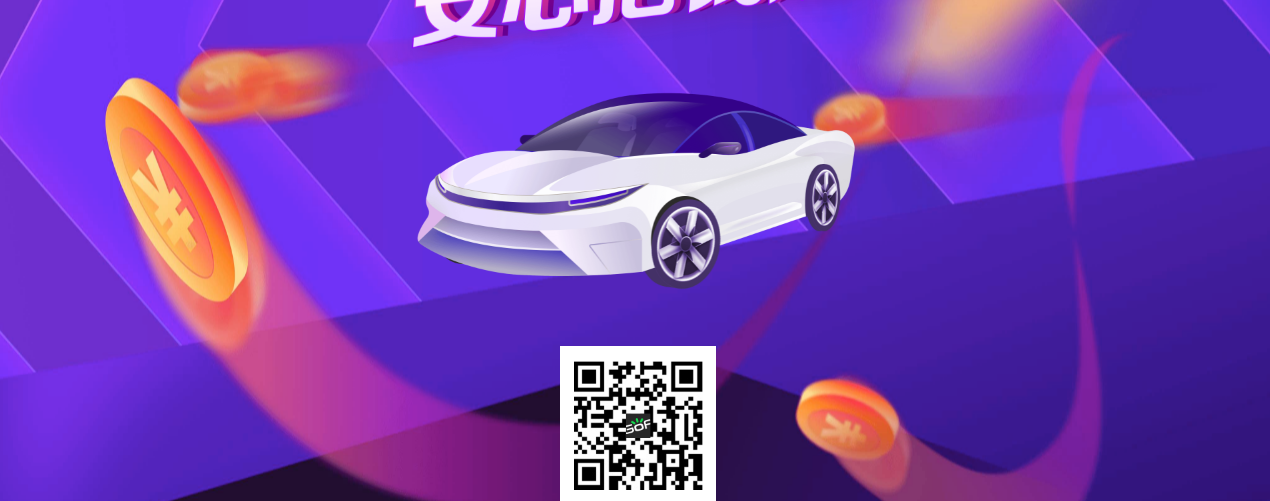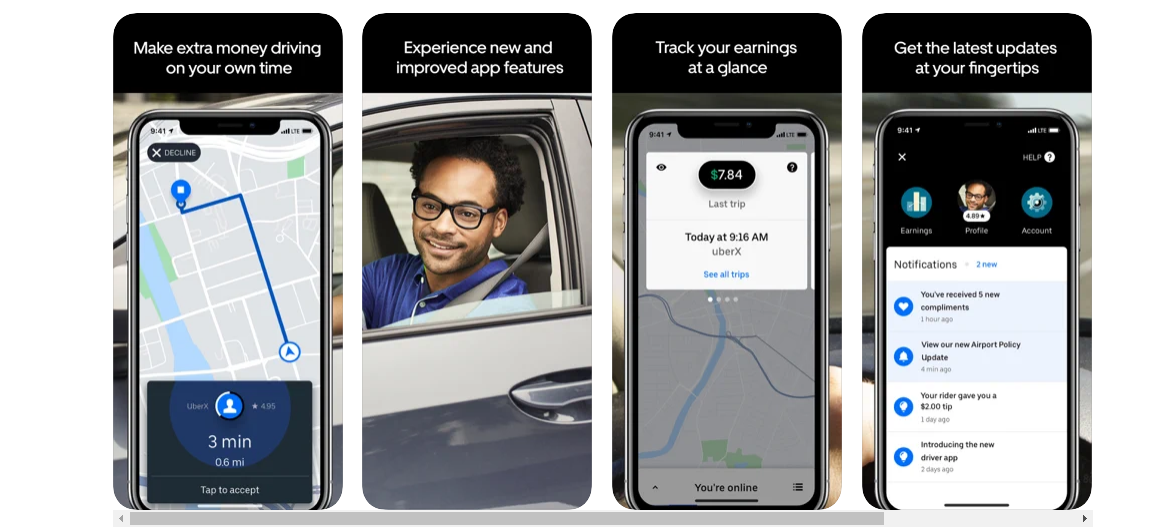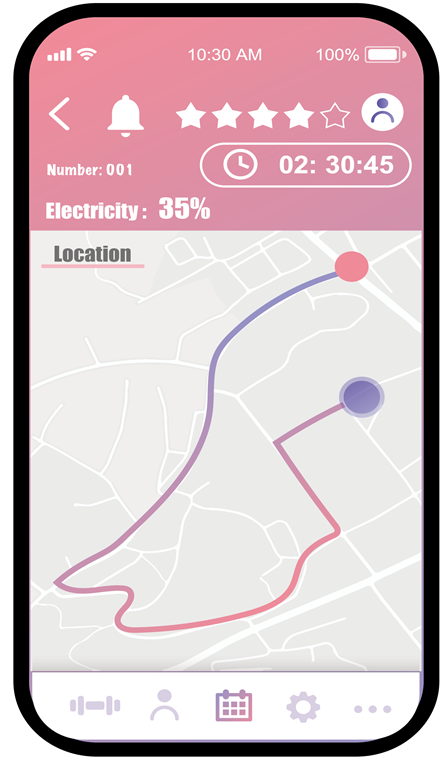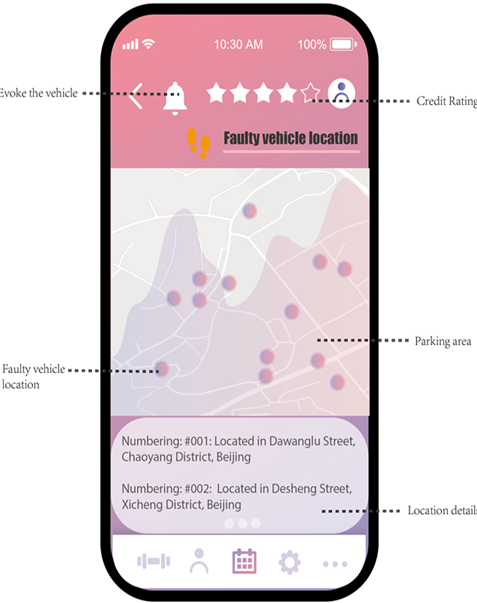Sustainability is a universal notion which attracts intensive concern in all facets of life, including development and economic prosperity. Essentially, the idea entails critical utility of available resources to ensure obtainability for future generations, by avoiding wastes and over-exploitation. With the surge in information communication technology and internet connectivity, there have been several advancements to limit wastage, especially the food industry. There are numerous sustainable design products in modern society. GoFun App and Uber App are some of the products perceived to be sustainable in design and bear distinctive attributes to meet the standards of sustainability in societies. The two apps are prominent among current generations as concept of innovation and creativity in sustainable development.
GoFun App
The invention of mobile apps in the 21st century has seen myriad developments both in the transport and communication sectors. GoFun App was designed by Shouqi Group as a car sharing app which provides users with convenience, economic savings and fashion urban public for fast travel experiences. It is a form of renting cars which aims at enhancing environmental sustainability by using electric cars. The customer can select cars based on interest, then pick the car and return it using the app. Such services are now available in more than 60 cities in China and aims at promoting sustainable design of transportation in the country and beyond.

Advantages and Disadvantages of GoFun App
Economic Sustainability concepts
This app is free to download, it only requires that the parent to have internet connection and access to Google App store to install the app. Therefore, there are no financial costs attached to using this app in any setting. However, there are emerging concerns on the sustainability of the app on the car owners (Qi et al., 2018). There are multiple cases of destroyed cars as a result of accidents among shared car users due to driving issues which tend to raise the question of its viability in long term. Some users may tend to rush in renting these services because they are fast and convenient, ending up in risky behaviors on the road.

Such accidents may implicate huge economic loss upon the car owners and result in enormous concerns. Although the app provides a faster means of transportation, users may face accidents which may hinder their movement. Notably, it becomes difficult to trace such vehicles without a proper technology in place. Passengers may remain stranded for a long time without proper framework of movement due to a breakdown.
Ecological Sustainability
This design is aimed at linking users to a faster means of transportation, which is safer, green and timely in operation. Essentially, shared cars are aimed at reducing greenhouse gas emission and curtail the problem of environmental pollution. According to Hang (2018), shared cars transportation in modern society has provided green travel services, enhancing new energy and use big data systems, including internet, artificial intelligence among other technologies which tend to optimize the use of urban design and layout. With the shared car apps, one does not need to make long queue waiting for the public service vehicles or wait in long traffic jams to move. However, there are myriad sustainability concerns about this product in China, including unbalanced development of the supporting services.
Sociological sustainability
The art of sharing vehicles and bikes has enhanced people’s lives in different ways. According to Ma et al. (2018), using shared vehicle eliminate congestion in different social settings and enhance comfort and convenience during travelling. Sunio, and Schmöcker (2017) further assert that shared car app designs such as GoFun should aim at enhancing environmental sound decisions and sustainable development plans. GoFun focus on convenient, comfort, timeliness and effective management of urban population to avert congestions and overuse of private cars. One of the major disadvantages of this app is that it creates mixed concerns on trust, health and safety of the shared platforms
Uber App
Ubber is one of the global models of commuting commonly used by urban dwellers. The app has a pool of registered drivers who offer transport services to individuals at a cost to help them navigate different regions. The product has incentivized private vehicles and helped decongest cities linking users from one corner to the other. A consumer uses this app by downloading and registering with the company to ensure that they can access the services online.

Advantages and Disadvantages of Uber
Economic sustainability
As a modern disruptor of business, Uber has created more than 160,000 jobs for drivers alongside other staffs who help in controlling and monitoring the systems (Cramer and Krueger, 2016). The company has had far-reaching economic implication in modern economy, creating massive opportunities for individuals worldwide (Swenne and Kuikka, 2017). The taxi drivers earn from their trips based on time, distance and other charges incurred by the consumers as indicated in Figure 3. It serves an additional income to countless families using the app. To consumers, this app is convenient and cashless, enabling them to encounter professionalism from drivers during commuting. However, it may face the problem of market flooding making drivers and other users. Beyond the wage concerns, Uber company often impose advertisement strategies, sometimes slashing fares to entice new users, yet make drivers to bear the costs. Such approaches may not be sustainable for certain drivers who depend on the App as a major platform for getting customers.
Ecological sustainability
Although there are numerous environmental questions about the sustainability of Uber services, there are multiple concerns about its effectiveness in protecting the environment. This model of transport seems to promote the purchase of more small cars to engage in the business, which in turn result in vehicle traffic in urban centers (Yang, Zhao, and Wang, 2020). This implies that there will be more emission of greenhouse gases resulting in elevated pollution issues. At the same time, there are more passenger- customer behaviors which raise questions on its sustainability in the long run. According to Habla et al. (2020), the emergence of electric cars fosters the focus on environmental protection and helps prevent pollution from CO2 emission. According to Roblek et al (2021), the use of such an app may help in reducing costs attached to environmental degradation to promote sustainable development within the urban setting.
Sociological/political sustainability
Essentially, shared cars and bikes are becoming common among different age groups reducing congestion. This app ensures a proper link between car owners and commuters to limit congestion and traffic concerns. At the same time, there are more passenger- customer behaviors which raise questions on its sustainability in the long run. The skeptical attitudes and perceptions about the drivers may often create a public concern among different socio-political classes worldwide. Uber, thus, arouse mixed reactions from different social fragments which may hinder its long term sustainability in different populations.
Comparing GoFun and Uber
GoFun and Ubber bear significant similarities in their mode of operation. In both cases, the application use technology to create shared mobility platforms. At the same time, the techniques are considered sustainable in their design because of the corporate social responsibilities enshrined in the operation. Using the criteria of political, economic and ecological evaluation, the apps bear fundamental sustainability designs in tackling environmental management issues under these spheres. Roblek et al. (2021) assert that care sharing app exist in the context of access to private fleet cars owned by organizations and person-to-person car sharing. In Europe, for instance, the electrification of cars has become a major practice aimed at protecting the environment from combustive greenhouse gas pollution (Habla et al., 2020). Such strategy will further improve the use of smart technology like GoFun to penetrate the world economy. One of the key differences between the two models is that Ubber gives a platform where private drivers can link with commuters while GoFun provides a platform for getting shared cars available within their rich. Likewise, GoFun adopts a modern public means of transportation linking users for convenience and timeliness while Ubber requires the user to wait for available drivers in the vicinity.
Sharing of vehicles in the shared mobility economy is a common practice in modern society, which entails utility of technology as a connecting medium. Thus, rental of vehicles posits massive opportunities and concerns in equal measure (Robles Diez and Schokenhoff, 2019). According to Ma et al. (2018), bike sharing started operation in China in 2016 with a sudden surge in the number of bike users beginning to adopt new technology platforms to communicate. GoFun group identified the gap in sharing cars and bikes to develop a mechanism through which they can make the interaction more friendly and self-reliant focusing on green economy.
Upon evaluation of the two models of sustainability designs, the GoFun App tends to have more advantage than Ubber App. Technically; Ubber seems to have a lot of socio-political concerns among the drivers and users. One of the key challenges faced by Ubber riders is that company’s policies on price competition for new users. Ecologically, Ubber attracts more investors while GoFun have specified number of cars for their business. As a result, GoFun is more environmental-friendly and may promote sustainable development in the long run. The key variables considered in this app should be the distance covered, car ownership, CO2 emissions, and congestion (Sunio and Schmöcker, 2017). The aforementioned variables are pivotal in evaluating the implications of bridging the gaps in the use of GoFun.
Solution: Shared Car App


I developed the shared car tool as a bridge for the existing sustainability issues aiming at providing an immediate solution to the challenge. The shared car app seeks to link travelers who may experience car breakdown or who would not wish to fuel their car for short destinations. In terms of the ecological benefits, the share care app limits the release of greenhouses gases into the atmosphere. The shared car app is software installed in smart phones to monitor the cars on rental business design and enable users to communicate with others nearby; thus, able to help individuals to navigate their ways to purchase items. It identifies any faulty vehicle on transit and links the commuters nearby vehicles to avert delays. This design aims at improving the sustainability of the vehicles by identifying any potential damage.
At the same time, the design explores how the app in figure 2 can be incorporated in the cell phones to reduce time wastage during traveling as result of breakdown within the same location. In essence, it can also help one to link up where the shared vehicle is located and reduce cost associated with personal cars, including family cars. Such an approach is both ecologically and economically sustainable in the long run. One needs to monitor their movements and minimize of fuel combustion which often results in environmental pollution and air degradation. Likewise the design can be linked to shared vehicle (Roblek et al., 2021). For sustainability, my design is aimed at helping people who use shared cars to communicate with mechanics as well as nearby users to eliminate wastage of time. The shared vehicle app will provide location details, the parking area, credit rating and other details about the faulty vehicle location. This approach will ensure continued movement of the commuters as a sustainable solution to vehicle damage and traffic control.
To conclude, the two sustainability designs seek to integrate technology as a crucial element in planning. The application of shared care app will entail specific focus on the sustainability of transport technologies linking commuters on GoFun App to avoid delays accustomed with car breakdowns. The aim of the new approach is to create a platform that decongest the cities from waiting bays and provide comfortable, convenient and timely services. Ecologically, the approaches will have tremendous reduction on pollution of the environment whether by biodegradable wastes or otherwise. In essence, the invention of a mobile app which can advance the utility of shared cares services will help GoFun App users to keep enjoying their ride without interruption of car breakdown becoming a major milestone in the quest for promoting environmental protection and sustainable developments across the world.
Reference List
Cramer, J. and Krueger, A.B., (2016). Disruptive change in the taxi business: The case of Uber. American Economic Review, 106(5), pp.177-82.
Habla, W., Huwe, V. and Kesternich, M. (2020). Beyond monetary barriers to electric vehicle adoption: Evidence from observed usage of private and shared cars. ZEW-Centre for European Economic Research Discussion Paper, (20-26).
Hang, G., (2018, December). Research on development problems of shared cars in china. In 4th International Conference on Economics, Management, Law and Education (EMLE 2018) (pp. 614-619). Atlantis Press.
Ma, L., Zhang, X., Ding, X. and Wang, G., (2018). Bike sharing and users’ subjective well-being: An empirical study in China. Transportation research part A: policy and practice, 118, pp.14-24.
Qi, W., Li, L., Liu, S. and Shen, Z.J.M., 2018. Shared mobility for last-mile delivery: Design, operational prescriptions, and environmental impact. Manufacturing & Service Operations Management, 20(4), pp.737-751.
Roblek, V., Meško, M. and Podbregar, I. (2021). Impact of Car Sharing on Urban Sustainability. Sustainability, 13(2), p.905.
Robles Diez, A. and Schokenhoff, M., (2019). Designing for User Tasks in Shared Autonomous Cars. Master’s Thesis. Chalmers University of Technology. Web.
Santos, G., (2018). Sustainability and shared mobility models. Sustainability, 10(9), p.3194.
Sunio, V. and Schmöcker, J.D., (2017). Can we promote sustainable travel behavior through mobile apps? Evaluation and review of evidence. International Journal of Sustainable Transportation, 11(8), pp. 553-566.
Swenne, L. and Kuikka, J., (2017). Design Guidelines for Shared Cars-Development of design guidelines for HMI and UX in cars designed for car sharing. Master’s Thesis. Chalmers University of Technology. Web.
Yang, H., Zhao, Y. and Wang, Y. (2020). Identifying modeling forms of instrument panel system in intelligent shared cars: a study for perceptual preference and in-vehicle behaviors. Environmental Science and Pollution Research, 27(1), pp.1009-1023.